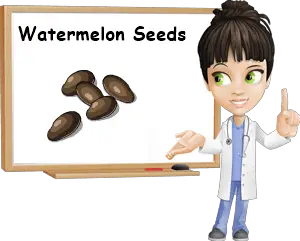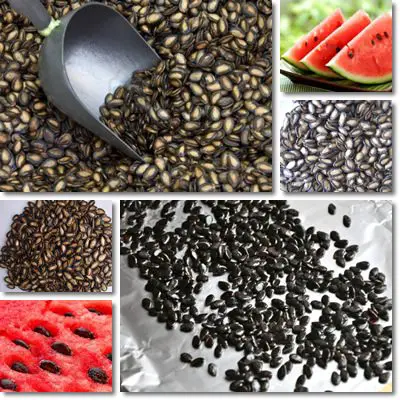We know watermelons are healthy for us. They help keep our kidneys in good shape, they hydrate us, they make a sweet, refreshing snack and they are a rich source of lycopene, a natural substance with wonderful heart protective and antioxidant properties.
But what about watermelon seeds? Are they any good for us? Should we eat them on purpose or not? The truth is that watermelon seeds are beneficial for us, contributing to good energy levels, nervous system and brain health, regulating blood pressure and offering antioxidant protection.
What do watermelon seeds look like?
Watermelon seeds are small, flat and oval-shaped, rounded at one end and pointed at the other. The seeds are initially milky white and gummy, but as the fruit matures they turn brown and black and develop a hard outer shell.
Inside there is a meaty, milky white kernel that constitutes the edible part of the watermelon seeds. As a child, I used to pick each and every one of those tiny black seeds and throw them away.
When I grew older however, I started enjoying them for their pleasant tasting kernels and benefits.

Can you eat watermelon seeds?
Watermelon seeds are edible and good to eat. While you can eat the seeds whole, as in ingest, only the milky white kernels are actually edible. The hard outer shell is not digested and usually comes out as it comes in, but doesn’t pose health risks when the seeds are consumed in small amounts or ingested accidentally.
However, eating large amounts of watermelon seeds whole, shell and kernels, is not something you should do because the shell is not edible, but you can definitely enjoy the kernels and get excellent nutrition and lots of benefits for health.
All watermelon colors have edible seeds, including the more common pink and red fleshed varieties, but also yellow fleshed watermelon varieties, orange fleshed watermelon and white fleshed watermelon.
Watermelon seed kernels have a good content of B vitamins and dietary minerals, are rich in antioxidants and boast energizing effects. And while they are not as meaty as sunflower seeds or have the same pleasant nutty taste and stronger flavor like peanuts or walnuts, there are lots of benefits to eating watermelon seeds. See below my list of the most noteworthy 5 nutrition facts and health benefits of watermelon seeds.
What are the benefits of Watermelon Seeds?
Antioxidant properties
Antioxidants protect cells and DNA against reactive oxygen molecules called free radicals, preventing cell and DNA damage buildup that may lead to potentially cancerous mutations.
Antioxidants also prevent excessive inflammation at cell level which has been discovered to encourage the development of chronic diseases such as cardiovascular disease, degenerative nerve diseases, diabetes and others.
Improve blood circulation
Watermelon seed kernels contain 3.55 mg (milligrams) of vitamin B3 or niacin per 100 g (grams) which is 22% of total daily vitamin values for an adult person. Niacin has been shown to improve blood circulation and thus contribute to cardiovascular and nervous system health. Niacin is a perfect example of how important B vitamins in general are for nervous system and brain health. A deficiency causes symptoms such as physical and mental fatigue, brain fog, mood swings, even depression, poor blood circulation and digestive upset.

Regulate body fluids and blood pressure
Watermelon seeds are a generous source of dietary potassium (648 mg), a mineral that regulates fluid levels in the body, counteracting water retention that contributes to elevated blood pressure levels and swelling.
How much potassium in watermelon seeds? There are 648 mg (milligrams) of potassium in every 100 grams of watermelon seed kernels which is 14.4% of total daily potassium values for an adult. Getting enough potassium in the diet is vital for good blood pressure numbers.
Potassium counteracts the negative effects of too much sodium in the diet causing high blood pressure number, a common side effect of a high salt intake. According to a recent study conducted by the Cambridge Sacred Heart University, watermelon seeds can lower systolic blood pressure measurably. This contributes to a lower risk of myocardial infarction in individuals suffering from coronary atherosclerosis and angina.
Seeds from all watermelon colors are equally nutritious and have the same benefits for health. Find out what are the benefits of yellow watermelon seeds, with nutritional information.
Good for tiredness and fatigue
Watermelon seeds combat and relieve tiredness and fatigue by contributing to red blood cell and hemoglobin production. This is owed to a good content of iron and B vitamins such as vitamin B6 and vitamin B9 whose main function is to help with the production of red blood cells and hemoglobin in red blood cells.
Vitamin B6 from watermelon seeds further improves the capacity of hemoglobin in red blood cells to bind to oxygen. Hemoglobin in red blood cells is responsible for transporting oxygen from the lungs to the rest of the body, oxygenating tissues. This contributes to a feeling of vitality and physical strength, as well as anti-anemia benefits.
Watermelon seeds are also a great source of other essential nutrients such as calcium, magnesium, phosphorus, potassium, zinc and B vitamins such as thiamine, riboflavin, niacin, in addition to folate and vitamin B6, all of which improve energy levels and help combat tiredness and fatigue with systemic benefits.
Good for healing burns
Studies show chemical constituents occurring naturally in watermelon seeds can accelerate burn healing by preventing the formation of a thick scar. Source: Effectivity of watermelon (Citrullus Lanatus) seeds extract on inducible nitric oxide synthase.
Potential side effects of watermelon seeds
If you are in the habit of eating watermelon seeds together with the fruit, you should be careful not to accidentally choke on them. Not only are they small and flat, but they are also extremely slippery due to the watermelon juice and easily go down the wrong pipe.
Unless you want one or more seeds to accidentally go down the wind pipe and potentially become a choking hazard, remove them from the fruit first, dry and then eat them.
Alternatively, you can buy watermelon seed kernels which are already shelled and, sometimes, even roasted. But why waste good seeds you already have? Save the seeds from your watermelon, clean any remaining pulp or juice, dry for 2-3 days in a cool place, or in the oven, and enjoy.
Another of the side effects of watermelon seeds is their laxative effects. If you are not looking forward to somewhat unexpected and urgent trips to the bathroom, it’s best to avoid eating too many watermelon seeds at once.
It’s also a good idea to just eat the kernels inside the watermelon seeds, without the hard, black shell. The outer shell is a rather tough fiber and may cause intestinal blockage in rare cases, although it’s good to know that this is a rare occurrence and usually only caused by ingestion of unreasonable amounts.
The milky white immature seeds that are soft and gummy do not pose this risk as they have no hard outer shell and actually get digested. Just as important, being a good source of dietary fiber, the immature seeds help add bulk to stools, stimulating contractions in the muscles of the intestinal tract which move food along the digestive tube, encouraging increased bowel movement frequency and relieving constipation.
It’s possible you may have noticed that, if you accidentally eat more of the mature, hard-shelled watermelon seeds, whether you chew or swallow them whole, they come out just as they came in. The black outer shell being tough and fibrous, it doesn’t actually get digested, or at least not completely, hence why it tends to come out just as it goes in. The same thing goes for corn: if you’ve ever wonder why corn comes out whole, know it does not always digested completely due to its high content of very rough fiber material.
Conclusion
Watermelon seeds, both the hard-shelled and even just the creamy white kernels, are not just edible, but also surprisingly healthy. Even so, it’s understandable why there are increasingly more seedless fruits being developed, such as watermelons and bananas. However healthy, fruits without seeds provide a better eating experience and pose fewer risks such as choking hazards.
At the same time, edible seeds in general, not just watermelon, concentrate impressive amounts of essential vitamins and minerals as well as other beneficial constituents with a range of benefits for health. And seedless watermelons are simply missing an edible and surprisingly nutritious component.
